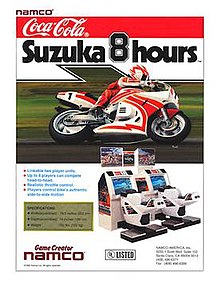Suzuka 8 Hours (video game)
| Suzuka 8 Hours | |
|---|---|
 Arcade flyer | |
| Developer(s) | Namco |
| Publisher(s) | Namco |
| Series | Suzuka 8 Hours |
| Platform(s) | Arcade, Super Nintendo Entertainment System |
| Release | |
| Genre(s) | Racing |
| Mode(s) | Single-player, multiplayer |
| Arcade system | Namco System 2 |
Coca-Cola: Suzuka 8 Hours[a] is a 1992 motorcycle racing arcade game developed and published by Namco. It is based on the homonymous real-world racing event. Players control a racer using a handlebar controller and must race against computer-controlled opponents while remaining in first place. It ran on the Namco System 2 arcade hardware. A direct sequel, Suzuka 8 Hours 2, was released a year later.
Gameplay[]

The game was made available in two-player cabinets featuring two monitors and two replica motorcycles; players accelerate their bikes by holding down the throttle grip and brake by using the brake lever, while steering is accomplished by physically leaning the bike left or right. The arcade game can be played by up to eight players simultaneously by linking four two-player cabinets together, and the players must complete an entire lap of the track within a preset time limit - and upon completion of a lap, the time is extended for all players in the race. The first player to complete a preset number of laps (between 3 and 6 and adjustable by the arcade operator) wins the race; as in Final Lap and Dirt Fox (the latter of which was only released in Japan), if they manage to finish the race in less than a preset time, they have the opportunity to enter their initials upon the game's "best time" (as opposed to high score) table.
Release[]
Suzuka 8 Hours was later ported to the SNES, in 1993 by Arc System Works; the game simulates the actual eight-hour race as eight "virtual hours", or over ninety "real-time" minutes. The object is to complete as many laps as possible before the time runs out - and if it does, the timer starts going up again (as penalty time) and the next trip to the finish line ends the race.
Reception[]
In Japan, Game Machine listed Suzuka 8 Hours as being the most popular arcade game of June 1992.[4] In the United States, RePlay reported the game to be the top-grossing new arcade video game in October 1992,[5] and then the second most-popular deluxe arcade game in November 1992.[6] It was awarded the Gold Award at the 1993 American Amusement Machine Association (AAMA) trade show for sales excellence in the United States during 1992; it was one of five arcade video games at the show to receive a sales award.[7]
In their review of the SNES version, GamePro criticized the absence of sound from CPU competitors' engines and the "distracting" music; however, they praised the responsive controls and "sharp" graphics.[2]
Notes[]
References[]
- ^ Cook, Brad (1998). "Suzuka 8 Hours - Review". Allgame. All Media Network. Archived from the original on November 16, 2014. Retrieved April 13, 2021.
- ^ Jump up to: a b "Get Ready to Race". GamePro (58). IDG. May 1994. p. 114.
- ^ "Corrida - Suzuka 8 Hours" (in Portuguese) (33). Editora Abril. Ação Games. April 1993. p. 29. Retrieved April 13, 2021.
- ^ "Game Machine's Best Hit Games 25". Game Machine (in Japanese). No. 429. Amusement Press. July 1, 1992. p. 29.
- ^ "RePlay: The Players' Choice". RePlay. Vol. 18 no. 1. October 1992. p. 4.
- ^ "The Player's Choice - Top Games Now in Operation, Based on Earnings-Opinion Poll of Operators: Best Deluxe Videos". RePlay. Vol. 18 no. 2. RePlay Publishing. November 1992. p. 4.
- ^ "ACME '93: Play Meter, AAMA present awards". Play Meter. Vol. 19 no. 5. April 1993. pp. 74–6.
External links[]
- 1992 video games
- Arc System Works games
- Arcade video games
- Bandai Namco Entertainment franchises
- Coca-Cola
- Motorcycle video games
- Multiplayer and single-player video games
- Namco arcade games
- Racing video games
- Super Nintendo Entertainment System games
- Video games developed in Japan
- Video games set in Japan